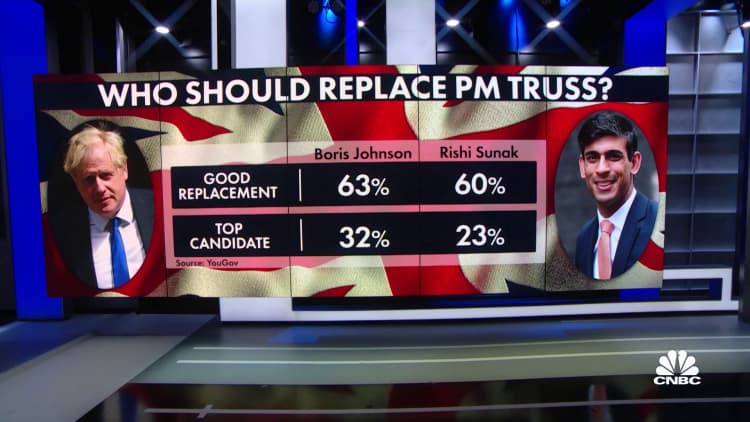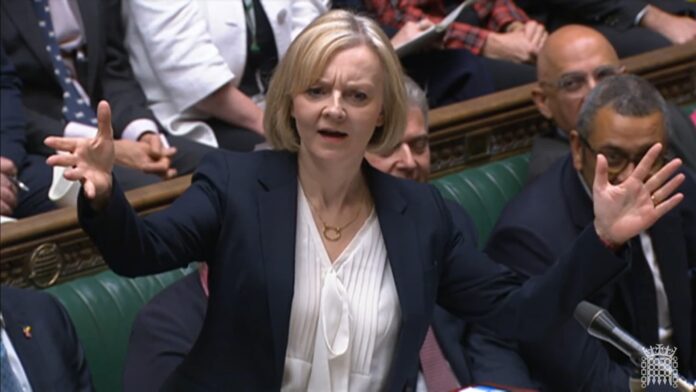Political chaos in the U.K. continues, including a high-profile resignation and questions over how long Liz Truss has in office.
House of Commons – PA Images / Contributor / Getty Images
LONDON — An extraordinary day in British politics plunged embattled Prime Minister Liz Truss into even deeper turmoil.
On a fast-moving day of developments, Wednesday saw a high-profile resignation, reports of parliamentarians being bullied and further speculation over how long Truss may have left.
The culmination of events prompted one member of the Conservative Party to publicly express his anger with the government.
“This is an absolute disgrace,” Conservative lawmaker Charles Walker told BBC News on Wednesday evening. “I think it’s a shambles and a disgrace. It’s utterly appalling,” he said.
“I hope all those people that put Liz Truss in Number 10, I hope it was worth it … Because the damage they have done to our party is extraordinary,” Walker said, visibly angry as he spoke.
“I’ve had enough of talentless people putting their tick in the right box not because it’s in the national interest but because it’s in their own personal interest,” he said.
Here’s a look at how the day unfolded.
Wednesday midday: ‘A fighter not a quitter’
At midday on Wednesday, Truss faced fellow lawmakers in the House of Commons for the first time since a major U-turn on her controversial fiscal package.
The government’s so-called “mini-budget” on Sept. 23 was the first – and last – big fiscal announcement from former Finance Minister Kwasi Kwarteng, who was hastily replaced by Jeremy Hunt following a backlash to the spending plans.
Truss said she was “a fighter not a quitter” as she was grilled by parliamentarians.
Opposition Labour leader Keir Starmer asked how the British public could have faith in a leader whose “promises didn’t last a week.”
Truss has apologized for mistakes made during her first six weeks in office.
Wednesday evening: A resignation and bullying accusations
Britain’s Interior Minister Suella Braverman was then added to the list of departures from Truss’ government, as she resigned after just 43 days in the position – the shortest stint in the role since World War II.
In her resignation letter, Braverman said she sent an official document from a personal email – breaching ministerial rules – and that this was the reason for her departure. But she also used the letter to express her “concerns about the direction of this government,” saying that key pledges to voters had been broken.
“Pretending we haven’t made mistakes, carrying on as if everyone can’t see that we have made them, and hoping that things will magically come right is not serious politics. I have made a mistake; I accept responsibility; I resign,” Braverman said.
Braverman has been replaced by former Transport Minister Grant Shapps.
Later on Wednesday evening, lawmakers were asked to vote on whether fracking would be completely banned across the U.K., but members of the Conservative Party were told the vote was being treated as a “confidence motion” in Truss’ government.
Members were also told they would “lose the whip” – effectively losing their position in Parliament – if they voted to ban fracking. Unsurprisingly the majority voted not to ban fracking.

The vote itself was chaotic, with reports of members being “bullied” into making the decision favored by the Conservatives.
“That looked like bullying to me. It’s bullying like I’ve not seen since school,” Labour MP Chris Bryant told BBC News.
A government spokesperson was not immediately available to comment when contacted by CNBC on Thursday morning.
Party whips – those tasked with encouraging members to vote in line with the party consensus – can be quite assertive, Bryant said, but they typically use “the force of reason, not the force of force.”
Thursday morning: Truss has 12 hours to ‘turn the ship around’
Thursday morning saw Conservative MPs trying to explain the events of the night before – and delivering fresh assessments of how long Truss has left in office.
Transport Minister Anne-Marie Trevelyan described Wednesday as a “very turbulent day,” speaking on the BBC’s “Breakfast” program, but she defended the prime minister.
“Yes, Liz Truss is our prime minister and she has the confidence of the Cabinet,” Trevelyan said when asked if Truss was the right person to lead the government.
Conservative MP Simon Hoare said the next few hours would be critical for Truss to retain her authority.
He said he had never seen such a growing sense of pessimism across all wings of the party, speaking on BBC Radio 4’s “Today” program.
“Can the ship be turned around? Yes. But I think there’s about 12 hours to do it,” he said, describing Thursday and Friday as “crunch days” for the prime minister.


